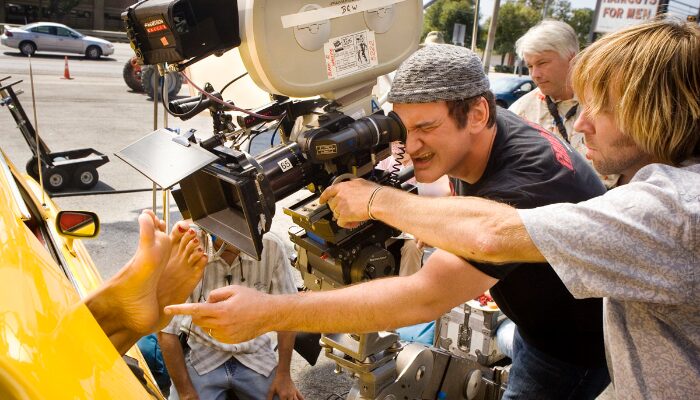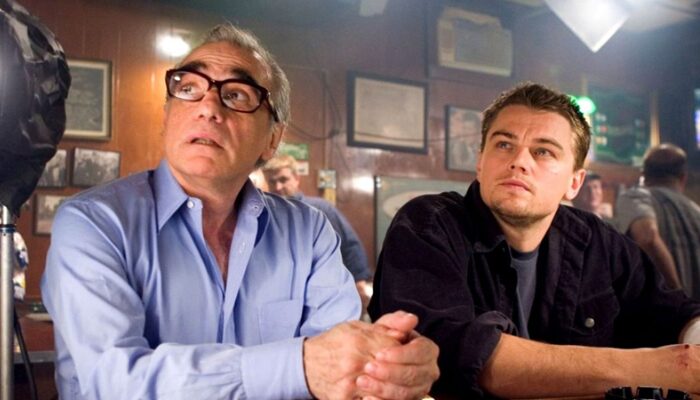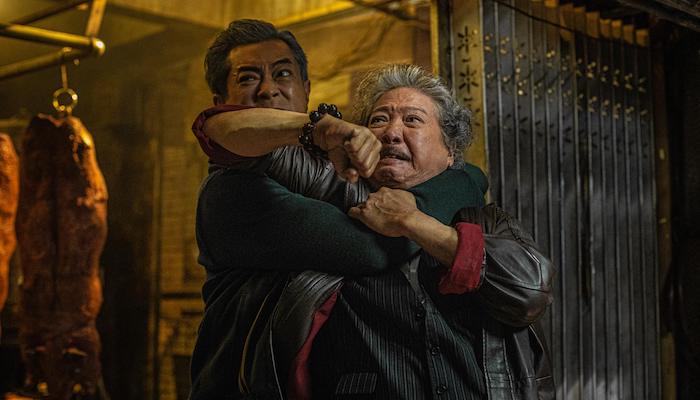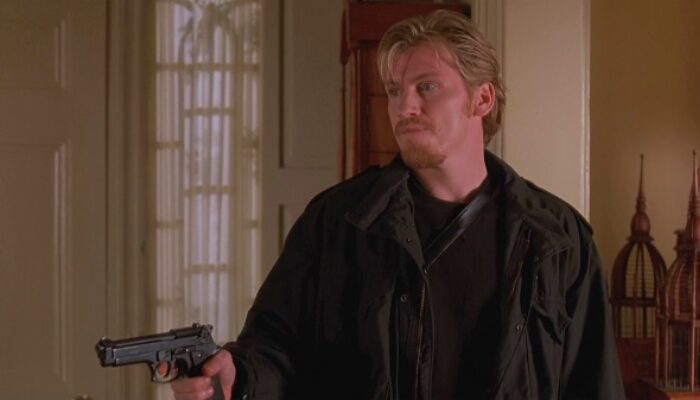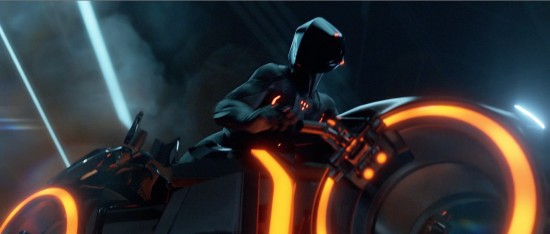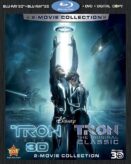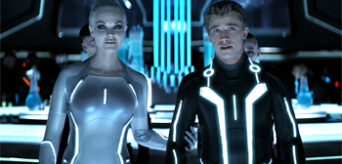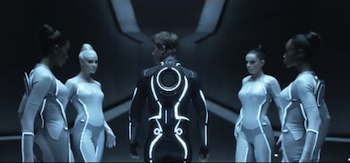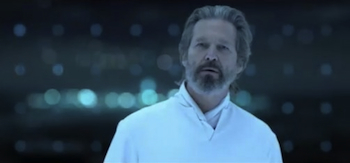TRON: LEGACY: Scientific Concepts, Script Quality, Plot Themes Analysis
The central idea that resonated with me during the recent After Dark debate – The /Filmcast: After Dark – Ep. 128 – Assessing the Themes of TRON: Legacy – was that TRON: Legacy did not deserve the deep discourse it was receiving during their podcast because 99% of the theoretical topics being broached were never brought up in a concrete way during the film. That is a tough one to argue against. Silas Lesnick and Devin Faraci have given their thoughts on those scientific concepts and plot themes. Here is my volley on their takes while giving my own as well.
The Hamlet Connection
Silas Lesnick‘s TRON: Legacy plot comparison to Hamlet – written here: Both Guns Drawn: `TRON Legacy’ as Allegory – is immensely intriguing. He takes his idea and backs it up with facts from the film to bolster his argument in a very convincing way.
At the heart of the story is Sam Flynn and the loss of his father. The “real world” that he’s living in is a paralleled by the Grid. ENCOM’s empire, like the computer world, is built by Kevin Flynn and Sam’s response to it is through actions and ideals that Sam isn’t sure are even his own. It’s the classic Hamlet setup and Sam is torn between avenging the ghost or suffering the slings and arrows of ENCOM.
That’s also a concept that tends to get explored in staged versions of Hamlet, with the Ghost and Claudius oftentimes played by the same actor.
“He’s either chilling on a beach in Costa Rica,” Sam tells Alan Bradley at the start of the film, “or dead. Or Both.” These are the two impressions that Sam has for his dad either a dead but loving spirit or living entity whose world was better off without young Sam in it.
Then it’s revealed, as the plot progress, that Kevin Flynn is, in fact, both. In the Grid, Sam finds both the ghost of his father and another version who would rather clear his world of imperfections like Sam.
I personally doubt the screenwriters put that much thought into the relationship ENCOM, Kevin Flynn (Jeff Bridges), CLU, and Sam Flynn (Garret Hedlund) had with each other. If the educational background of TRON: Legacy screenwriters Adam Horowitzm and Edward Kitsis was that of English majors, this subtext could be explained as it might have seeped into their screenplay unbeknownst to them. It is there subliminally if the viewer looks for it but that is the problem isn’t it. You have to look for it. It is not presented to the viewer overtly. I’m not talking about some heavy-handed approach like the themes in Avatar but delicately like in Blade Runner. Lesnick believes that
In the Grid, Sam finds both the ghost of his father and another version who would rather clear his world of imperfections like Sam. What are they battling for? Literary and metaphorically, the identity of Kevin Flynn.
I do not believe CLU in any way wants the identity of Kevin Flynn. CLU wants Kevin Flynn to be like him, a seeker of perfection like he used to be. Since he isn’t anymore, CLU has decided to leave what’s left of Kevin behind in the pursuit of something greater than the both of them. An ideal. Remember what V said in the comic book V for Vendetta: “There’s no flesh or blood within this cloak to kill. There’s only an idea. Ideas are bulletproof” hence CLU’s programmed, unshakable need to carry on as – metaphorically speaking – the real Kevin Flynn, the one that created him, the version of a person that died a long time ago. CLU is now that legacy as is Sam Flynn. Their fight is over that tangible and intangible concept (give the world ISOs or give the world CLU i.e. perfection) not Kevin Flynn’s literal and metaphorical identity.
The Nature of ISOs
Lesnick argues that ISOs are true AIs then Devin Faraci counter argues here: The Best TRON: LEGACY Defense Yet Written (Is Still Wrong) that ISOs do not function as AI, saying that
The film needs to – at any point – show us that this is the case.
ISOs can learn, adapt, change. CLU and the other programs can not. Remember Jarvis (James Frain) – CLU’s right-hand program and chief intelligence officer – holding the book sideways? It couldn’t read, didn’t know how to, and could not even recognize the concept of it. It hadn’t been programmed to. Quorra (Olivia Wilde) could read (most-likely taught by Kevin Flynn) yet had never been programmed to. She could adapt and learn as she showed when she decided to take herself “out of the equation.” It was independent thinking. Lesnick continues
CLU operates within the dictates of an immensely complex program while Quorra transcends the same barriers.
Advertisement
All the other programs, including CLU, are simply following the code written for them long ago or their interpretations of it. Quorra writes her own, forms her own neural pathways from experiences, external stimuli, by learning, and adapting. Because of this and current concepts of AI, Lesnick believes
Theoretically replicable and independently minded, AI could be put to the same tasks as the world’s brightest scientists and push on unburdened by fatigue or personal problems…one might launch a thousand Quorras in more idealized computer setting and put them to work curing cancer, years of research happening in just a fraction of real world time.
The problem with this is that though Quorra is independently minded, she is not theoretically replicable. If that were the case, “The Purge” would have been of no great concern and Kevin Flynn could make more ISOs as he did CLU. Fiara’s belief is in accord with this.
They’re definitely not replicable, which is why Quorra is so valuable by the end of the film – she’s the last of the ISOs.
This might not mean that Quorra isn’t AI though, just that more can not be “made” of her or her kind. It might just mean that these AI fail Silas’ definition of what AI is and that he requires a new one. The real reason for this conjecture over ISO and AI is because TRON: Legacy‘s screenplay is flawed in this area, open-ended by accident not by design. Faraci agrees with this assertion, saying that he
would argue that what ISOs are and what they do are ill-defined and presented as some kind of nebulous magic bullet.
This is a common practice in big budget films. A highfalutin idea is thrown in and it becomes one of the driving points in the film as was witnessed in Mission Impossible 3 with the “device” Tom Cruise eventually had to steal. Faraci quips
It’s rare that I want a movie to explain things to me, but I definitely needed the connection between Olivia Wilde in skin tight plastic and the cure for cancer to be explained in better detail.
*Snickers* Agreed. The ensemble Olivia Wilde was garbed in served the marketing function of Walt Disney Pictures. Once again, a big budget film practice.
Scientific Concepts
I agree with Lesnick in that people take concepts like AI for granted and with Faraci’s point that TRON: Legacy exacerbated that situation while simultaneously belittling such concepts at the same time. I disagree with Faraci’s point on human immortality because Kevin Flynn aged while he was on The Grid.
And in this film we learn that computer people, despite having no matter, can be transported out of the computer.
That was a big problem I had that was never addressed but I do not believe this will lead to human immorality since Quorra is not human. It will lead to program morality – a flesh and blood aging experience for them – that they may come to lament.
Beyond that, I don’t know where Tron: Legacy makes it clear that ISOs are a different kind of AI than normal programs. The interesting thing about ISOs is that they weren’t created – they came into existence on their own. They’re a miracle of spontaneous creation. Programs are created by the Users, but ISOs come more or less out of nowhere. I think the metaphor here is a clumsy one for the miracle of having children, which fits into the tortured father/son business going on elsewhere in Tron: Legacy.
I believe its more about the Big Bang theory and the circumstances being amenable for our universe to come into existence.
But the important thing is that at no point do we see an ISO doing anything different from other programs. In fact, I don’t even know what the programs in this film do; in the original Tron programs had functions in the system, and these functions defined their personalities. In Legacy programs are just the people who live in the computer world. Michael Sheen plays Castor, a program who runs a bar. What’s the in-system function of Castor? What’s more, Castor isn’t even Castor – he’s Zuse, who has disguised himself as Castor (the wheres and whys of that are impossibly boring). I don’t know how we’re going to decide when AI is full AI, but I would guess a program essentially ‘re-writing’ itself fits the bill. Castor seems more possessed of free will than ISO Quorra, who just runs around after Kevin Flynn like a puppy.
Absolutely correct by Faraci except we only see one declared ISO doing anything. Programs with social lives, serving no definable purpose was another of TRON: Legacy‘s screenplay malfunctions. The programs in the last two Matrix movies let you know what function they performed. In The Grid, its anyone’s guess what service the bum program with the hooded trench coat provides.
Regarding Castor/Zuse (Michael Sheen), the argument could be made that he is the second-to-last ISO on The Grid. This explains why *spoiler* CLU destroys him and his club in the film, erasing him and his stain from the system forever. *end spoiler* This would also explain why Zuse and Quorra knew each other in the past and why he could think independently, adopting an alternate persona yet performing no program function on The Grid. Faraci would most-likely counter by saying this was neither hinted at nor implied in the film. I would have to agree with that but the explanation does fit.
In Conclusion
Faraci concludes or proves his final point in far more convincing fashion than Lesnick did in his essay, especially with Sam taking the ENCOM throne and running the company as his father would have instead of finding his own way in life and setting out his own path. I do not agree with Faraci adamant assertion that TRON: Legacy is terrible. Flawed yes, severely flawed maybe but not disposable. Disposability is the province of the Transformers franchise. I defended and enumerated TRON: Legacy‘s good and low points here: Film Review: TRON: Legacy (2010). What Faaci has not considered, what he and Silas did not mention in their essays was that if TRON: Legacy was so lacking in merit, plot, and substance why write about it ad nauseam? There must be something there worth writing about, worth discussing, something worthy of added thought. Perhaps it is TRON: Legacy‘s wasted potential that is so vexing as to elicit such repeated discussion. That could be it. Inception and The Matrix inspired a multitude of discussions as well but TRON: Legacy is no Inception or The Matrix though all three deal with: entering a different reality, involve rules for dealing with that reality, escaping that reality, a quest in that reality, finding and dealing with a loved one there, and going home. Damn, they are similar aren’t they?
Related Articles
FilmBook's Newsletter
Subscribe to FilmBook’s Daily Newsletter for the latest news!

